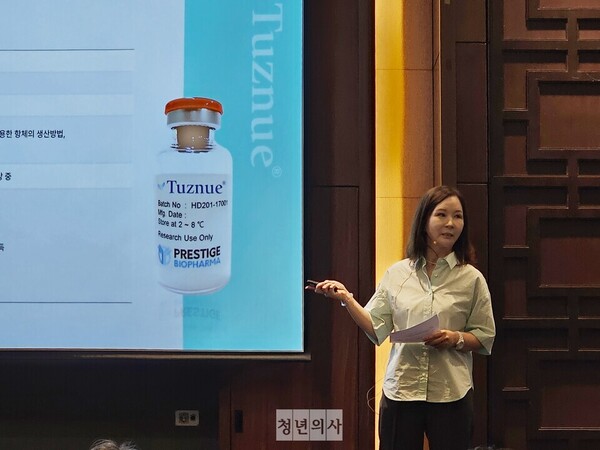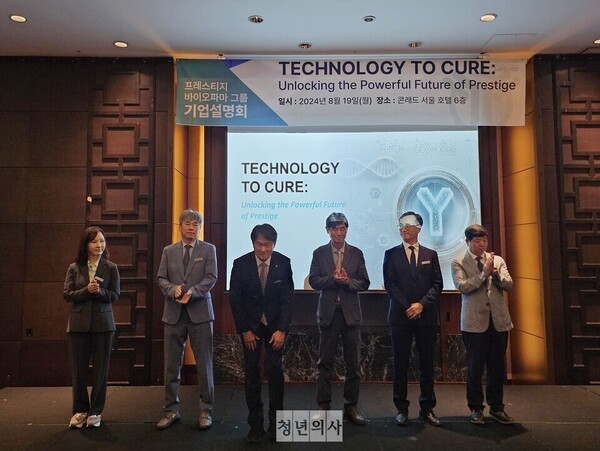“Prestige BioPharma started as a small team of four in Singapore in 2015 and leaped to become a global biopharmaceutical company by listing on the KOSPI market in 2021. We are now entering a period of full-scale growth and aim to achieve a market capitalization of 30 trillion won ($22.4 billion) by 2030 and lay the foundation to become a 100-year company.”
Prestige BioPharma Group Chairwoman Park So-yeon said so, disclosing her group’s ambitions at a Monday corporate briefing held at the Conrad Seoul Hotel in Yeouido, Seoul.

Park expressed optimism about the biosimilar market, emphasizing that it is still a blue ocean.
“The biosimilar market may seem competitive on the surface, but it is a blue ocean business where only a few high-tech companies can enter due to high technical and investment barriers. With deregulation and pricing policy changes working in favor of businesses, biosimilars have ample growth potential in the future,” Park said.
Park forecast that the biosimilars market will likely be 90 trillion won by 2028, and many blockbuster antibody drugs are approaching patent expiration, providing an excellent opportunity for Prestige BioPharma.
In July, Prestige BioPharma received a “positive opinion” from the European Medicines Agency's (EMA) Committee for Medicinal Products for Human Use (CHMP) for its Herceptin (trastuzumab) biosimilar, Tuznue (HD201), and is on the verge of commercializing its first biosimilar.
“This is Prestige BioPharma's first step toward becoming a global pharmaceutical company,” Park said.
She noted that the company has completed product registration and is ready to sell it in more than 30 European countries. Through collaboration with global partners, the company is looking forward to 14.5 billion won in milestones.
“We talked with about eight companies to sell Tuznue in Europe and narrowed them down to three. Two of these partners are global leaders in the generic pharmaceutical market, with annual sales of over 3 trillion won and strong European sales networks. We expect to sign a final agreement timed with its formal approval in October,” Park said.
With Tuznue, Prestige BioPharma aims to enter the European market quickly and win approval in the U.S., hoping to capture a 10 percent share of the global Herceptin market.
“Tuznue is highly competitive in terms of quality and production efficiency. This will enable us to establish a strong presence in the global market, including Europe and the U.S.,” Park said.
In addition, Prestige BioPharma plans to complete the phase 3 clinical trial of Avastin (bevacizumab) biosimilar HD204 and apply for marketing authorization in Europe, including the U.K., within the year. “We expect full-scale sales from 2026,” Park said.
Besides, Prestige BioPharma is conducting a phase 1 study of PBP1502, a biosimilar to Humira (adalimumab), with plans to file for marketing authorization in the second half of 2026. “Our strategy is to enter the market swiftly and realize sales in phase 3-exempt countries, such as the U.K., Canada, and some developing countries,” Park said.
Park also expressed her expectations about PBP1510, a new drug for pancreatic cancer.
“PBP1510 is the first antibody-drug worldwide to target PAUF protein expressed in more than 80 percent of pancreatic cancer patients. We are conducting phase 1/2a trials in Spain, the U.S., Singapore, and Australia, and the initial results are very encouraging. We are confident that PBP1510 will be a game-changer in treating pancreatic cancer and are targeting a global market share of 35 percent by 2026,” she explained.

In the following question-and-answer session for institutional investors and media, Park answered queries on Prestige BioPharma's drug development status, strategy in the biosimilar market, and future growth plans.
Asked about the clinical progress of PBP1510 and its expected therapeutic effects, Park said, “We are confident that PBP1510 will set a new standard in treating pancreatic cancer. We are making encouraging results in phase 1 and look forward to successful outcomes in additional clinical phases. We believe that PBP1510 can contribute to the fundamental treatment of pancreatic cancer.”
“In addition to pancreatic cancer, we are also studying other cancers where PAUF protein is expressed, including ovarian cancer and prostate cancer, and are working to expand the indications of PBP1510 so that more patients can benefit from it,” Park said.
Asked about Prestige BioPharma's chances of reaching its target market capitalization of 30 trillion won, Park said, “Prestige BioPharma has laid a solid foundation for growth by developing innovative antibody drugs based on our now stable biosimilar business. We are achieving rapid growth with our two-track strategy and global production network. Achieving a market capitalization of 30 trillion won by 2030 is a realistic goal. We are confident that we will not stop moving forward.”
On Prestige Biologics' strategy to respond to the U.S. Biosecurity Ac, Executive Director Yang Jae-young said, “Due to the law’s introduction, global pharmaceutical companies that previously relied on China are looking for new production bases. Prestige Biologics is experiencing a surge in inquiries for new CDMO (contract development manufacturing organization) contracts, and we are already in discussions with several global pharmaceutical companies.”
Yang continued, “We are poised to position ourselves as a beneficiary of the Biosecurity Act, which will further strengthen our competitive position in the CDMO business.”
Related articles
- Prestige BioPharma secures EMA's positive opinion for Herceptin biosimilar
- Prestige Biologics hires former Lonza official as new director
- Prestige BioPharma secures EC approval for Herceptin biosimilar Tuznue
- Prestige Biologics publishes study on pancreatic cancer target PAUF
- Prestige BioPharma opens Korea’s largest innovative drug R&D center in Busan
- Prestige Biopharma scouts sales expert from AbbVie
- Prestige Biopharma and Dr. Reddy’s push Herceptin biosimilar into Brazil

